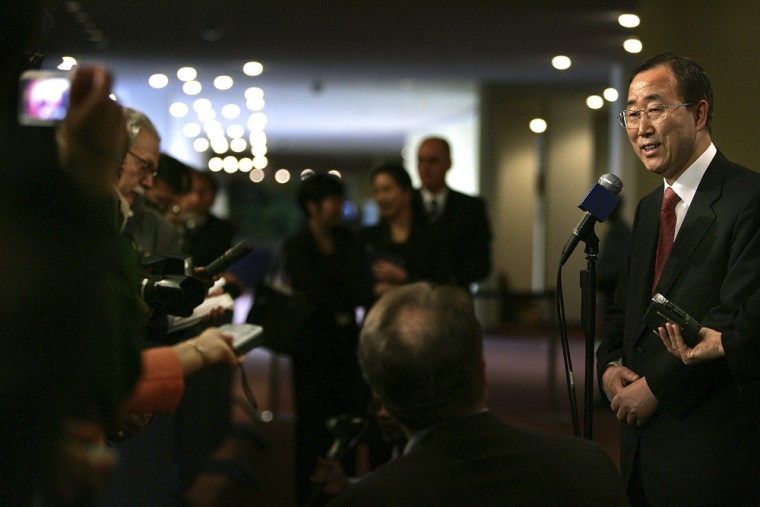New U.N. Secretary-General Ban Ki-moon ran into trouble on his first day of work Tuesday over Saddam Hussein’s execution when he failed to state the United Nations’ opposition to the death penalty and said capital punishment should be a decision of individual countries.
The U.N. has an official stance opposing capital punishment, and Ban’s predecessor Kofi Annan reiterated it frequently. The top U.N. envoy in Iraq, Ashraf Qazi, restated it again Saturday after the former Iraqi dictator was hanged.
Ban, however, took a different approach, never mentioning the U.N. ban on the death penalty in all its international tribunals, and the right to life enshrined in the U.N. Charter.
“Saddam Hussein was responsible for committing heinous crimes and unspeakable atrocities against Iraqi people, and we should never forget victims of his crime,” Ban said in response to a reporter’s question about Saddam’s execution Saturday for crimes against humanity. “The issue of capital punishment is for each and every member state to decide.”
His ambiguous answer put a question mark over the U.N.’s stance on the death penalty. It also gave the new chief an early taste of how tricky global issues are, and how every word can make a difference.
Michele Montas, Ban’s new spokeswoman, insisted there was no change in U.N. policy in what she described as “his own nuance” on the death penalty.
“The U.N. policy still remains that the organization is not for capital punishment,” she said. “However, the way the law is applied in different countries, he left it open to those different countries.”
The death penalty is legal in Ban’s homeland, South Korea, as it is in many other countries including the United States, Russia, China and much of the Middle East.
Ban, who took over on New Year’s Day from Annan, is the first Asian to serve as secretary-general in 35 years. Tuesday was his first day of work at U.N. headquarters.
Dozens of staffers applauded and joined a throng of cameramen and photographers snapping photos as he entered the building.
He immediately went to the Meditation Room and bowed his head in tribute to U.N. peacekeepers and staff members who died in service.
Ban then launched into a series of meetings with U.N. staff and surprised many when he walked into the staff cafeteria for lunch. He waited on line with his tray to pay for a meal of meat with rice and a bottle of water and ate with a few U.N. employees.
Aiming to cut extreme poverty in half
Speaking to reporters earlier, Ban vowed to end mistrust of the United Nations and called for action to tackle “daunting” problems from crises in Darfur, Lebanon, Iran and Iraq to the goal of cutting extreme poverty by half by 2015. He also renewed his promise to give priority to the North Korean nuclear issue and to defend human rights.
Ban announced that his first overseas trip will be to attend the African Union summit in Addis Ababa, Ethiopia, on Jan. 29-30, and he hopes to meet Sudan’s President Omar al-Bashir there.
He said he will meet his special envoy on Darfur, Jan Eliasson, Wednesday morning and put “my highest attention on this” issue in hopes of resolving the conflict peacefully as soon as possible. Ban will chair a meeting Thursday of the Darfur Task Force, which includes all U.N. agencies involved in trying to end the conflict, Montas said.
Ban later addressed hundreds of U.N. staff members in New York and via teleconference at eight locations around the world, urging them to maintain the highest level of ethics and discipline in the face of recent criticism about lack of accountability, ethical lapses and inefficiency at the U.N.
“I stand before you humbled, with a heavy weight on my shoulders, but my heart is beating with quiet excitement,” he told them.
The new secretary-general has said his first priority will be to restore trust in the United Nations, whose reputation has been battered by the oil-for-food scandal in Iraq, corruption in the U.N.’s purchasing operations, and sexual abuse by U.N. peacekeepers.
